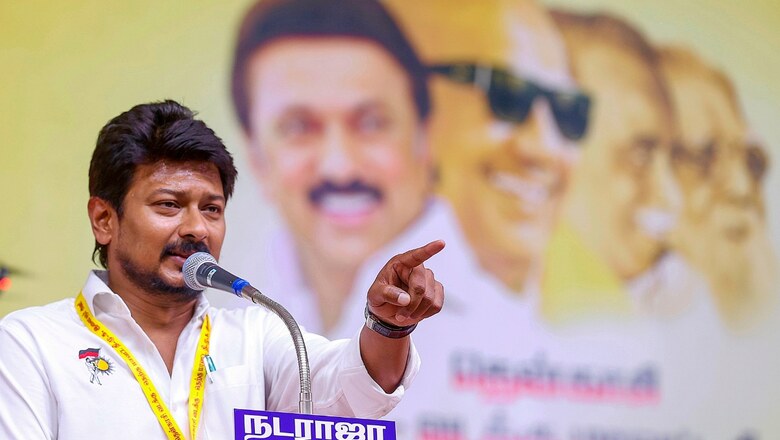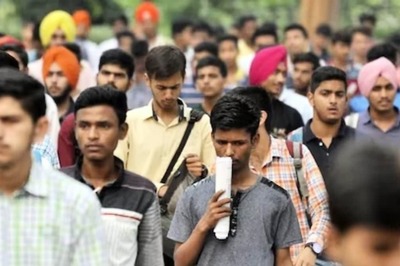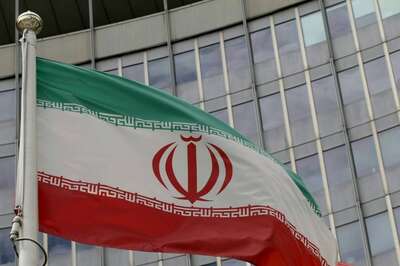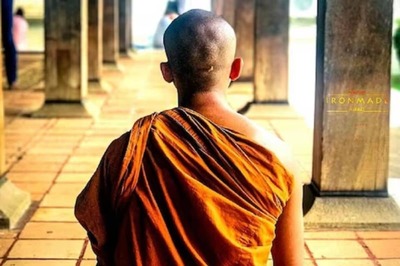
views
On September 3 2023, Minister of Youth Welfare and Sports Development, Udhayanidhi Stalin, son of DMK supremo and chief minister MK Stalin, spoke at a writers’ conference in Tamil Nadu, titled ‘Sanatana Abolish Conference’. He thanked the organisers for naming the event ‘Sanatana Abolish Conference’ instead of anti-Sanatana and went on to add: “A few things cannot be opposed; they should be abolished only. We can’t oppose dengue, mosquitoes, malaria, or corona. We have to eradicate them; that’s how we have to eradicate Sanatana. Rather than opposing Sanatana, it should be eradicated.”
The condemnatory language used against Sanatana Dharma, which is another way of describing Hinduism or Hindu Dharma, naturally created outrage, especially in a country where the overwhelming majority are Hindus. To compare an entire religious tradition to dengue, mosquitoes, malaria and corona, is a statement not only of unpardonable linguistic excess but highly insensitive and inflammatory. The phraseology used cannot be condoned.
Udhayanidhi should apologise, although he did later seek to clarify on X, formerly known as Twitter: “I am ready to present extensive writings of Periyar and Ambedkar, who conducted in-depth studies on Sanatana Dharma, and its negative impact on society in any forum.”
The anti-religion movement—and especially orthodox Hindu social practices—has an entrenched tradition in the genesis and evolution of modern politics in Tamil Nadu. The Dravida Munnetra Kazhagam (DMK) has its origins in the philosophy of E.V. Ramaswamy ‘Periyar’, who founded the Self-Respect Party in 1925, which was strongly against religion and its misuse to perpetuate the inequities and exploitation of the caste system. He was a self-proclaimed rationalist and atheist, and a crusader for social reforms relating to caste and gender. For these, he held Sanatana and the Brahmanical system responsible. In 1938, the Self-Respect Party and the Justice Party, of which too Periyar was a member, merged. In 1944, this new entity was formally named Dravidar Kazhagam, which was later further divided into the DMK and the AIADMK (All India Anna Dravida Munnetra Kazhagam).
There is, therefore, a context to what Udhayanidhi said, although undoubtedly, the manner in which he phrased it was unacceptable. More importantly, a distinction has to be made between Sanatana as a philosophy, the grandeur and profundity of its thought and worldview, and the exploitative and oppressive social practices which it later sought to legitimise. Sanatana Dharma is considered eternal because of the remarkable depth, cosmic insight and openness of its cerebral content, and its conquering eclecticism. But it is true that the social ills that have proliferated within it should not—indeed must not—be considered eternal. At the philosophical level, Hindu philosophy does not recognise any hierarchical discrimination. For instance, under the powerful Advaita school of thought, there can be no distinction of status between one human being and another, because the same nirguna Brahman is in each one of us, and differences of identity are entirely mythical.
What Udhayanidhi did, in seeking the elimination of Santana Dharma, was to throw the baby out with the bathwater. Yet, the essential message of the need for radical social reform within Sanatana Dharma is unquestionable. The caste system, for which religion was misused to justify, led to centuries of oppression of the Dalits and other ‘lower’ castes. In fact, Sanatana Dharma, in practice, must be one of the only religions in the world which not only nurtures but aggressively ostracizes those within its own fold. The institutional subordination of women for millennia, sanctified by certain injunctions in so-called religious texts, is also a fact. The tragedy is that such obnoxious practices still continue, although less pervasively, in spite of the exemplary equality of all citizens bestowed by the Constitution and specific laws prohibiting them.
The call for urgent social reform within Hinduism has been made by eminent Hindus themselves. Of course, Dr Babasaheb Ambedkar was a strong critic of the inequities within Sanatana Dharma and believed that political democracy meant little unless it was accompanied by social justice. Jyotirao Phule, Swami Vivekananda, Mahatma Gandhi—and a host of other Hindu luminaries—have spoken and worked to eradicate these social evils. It may surprise most people that Veer Savarkar, who ill-advisedly advocated Hindu Rashtra in 1923, wrote far more on the need for social reform among Hindus. He wrote extensively on the seven fetters that Hindus need to jettison. These included Vedoktabandi, the exclusivity of access to Vedic literature and rituals to only the Brahmanical community; Vyavasayabandi, the restrictions put on individuals on their absolute right to choice of profession; Sparshbandi, the ‘sin’ and ‘blot on humanity’ of untouchability; Rotibandi, the ‘thoughtless’ belief that one loses one’s caste through inter-caste dining; and Betibandi, the unacceptable practice of disallowing inter-caste marriages.
The short point is that the younger Stalin, in seeking the ‘abolition’ of Sanatana, overlooked its many remarkable facets that are, indeed eternal, and used grossly intemperate language. His diatribe is inexplicable given the deep Hindu following of millions of Tamils and even excessive in the context of the anti-religion, anti-Sanatana tradition of Tamil politics. The anger of the feelings of millions of Hindus against what he said is understandable. However, the key point that should also be pondered about—and seriously addressed—is the need to eradicate the continuing social evils within the Sanatana tradition, which have never been sanctioned by Hindu philosophy.
The author is a former diplomat, an author and a politician. Views expressed in the above piece are personal and solely that of the author. They do not necessarily reflect News18’s views.




















Comments
0 comment